7 books about Cosman, Carol
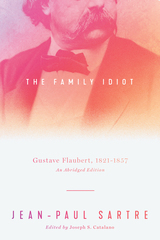
The Family Idiot
Gustave Flaubert, 1821–1857, An Abridged Edition
Jean-Paul Sartre
University of Chicago Press, 2023
An approachable abridgment of Sartre’s important analysis of Flaubert.
From 1981 to 1994, the University of Chicago Press published a five-volume translation of Jean-Paul Sartre’s The Family Idiot: Gustave Flaubert, 1821-1857, a sprawling masterwork by one of the greatest intellects of the twentieth century. This new volume delivers a compact abridgment of the original by renowned Sartre scholar, Joseph Catalano.
Sartre claimed that his existential approach to psychoanalysis required a new Freud, and in his study of Gustave Flaubert, Sartre becomes that Freud. The work summarizes Sartre’s overarching aim to reveal that human life is a meaningful adventure of freedom. In discussing Flaubert’s work, particularly his classic novel Madame Bovary, Sartre unleashes a fierce critique of modernity as nihilistic and demeaning of human dignity.
From 1981 to 1994, the University of Chicago Press published a five-volume translation of Jean-Paul Sartre’s The Family Idiot: Gustave Flaubert, 1821-1857, a sprawling masterwork by one of the greatest intellects of the twentieth century. This new volume delivers a compact abridgment of the original by renowned Sartre scholar, Joseph Catalano.
Sartre claimed that his existential approach to psychoanalysis required a new Freud, and in his study of Gustave Flaubert, Sartre becomes that Freud. The work summarizes Sartre’s overarching aim to reveal that human life is a meaningful adventure of freedom. In discussing Flaubert’s work, particularly his classic novel Madame Bovary, Sartre unleashes a fierce critique of modernity as nihilistic and demeaning of human dignity.
[more]
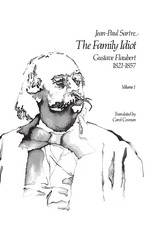
The Family Idiot
Gustave Flaubert, 1821-1857, Volume 1
Jean-Paul Sartre
University of Chicago Press, 1981
That Sartre's study of Flaubert, The Family Idiot, is a towering achievement in intellectual history has never been disputed. Yet critics have argued about the precise nature of this novel, or biography, or "criticism-fiction" which is the summation of Sartre's philosophical, social, and literary thought. Sartre writes, simply, in the preface to the book: "The Family Idiot is the sequel to The Question of Method. The subject: what, at this point in time, can we know about a man? It seemed to me that this question could only be answered by studying a specific case."
"A man is never an individual," Sartre writes, "it would be more fitting to call him a universal singular. Summed up and for this reason universalized by his epoch, he in turn resumes it by reproducing himself in it as singularity. Universal by the singular universality of human history, singular by the universalizing singularity of his projects, he requires simultaneous examination from both ends." This is the method by which Sartre examines Flaubert and the society in which he existed.
Now this masterpiece is being made available in an inspired English translation that captures all the variations of Sartre's style—from the jaunty to the ponderous—and all the nuances of even the most difficult ideas. Volume 1 consists of Part One of the original French work, La Constitution, and is primarily concerned with Flaubert's childhood and adolescence.
"A man is never an individual," Sartre writes, "it would be more fitting to call him a universal singular. Summed up and for this reason universalized by his epoch, he in turn resumes it by reproducing himself in it as singularity. Universal by the singular universality of human history, singular by the universalizing singularity of his projects, he requires simultaneous examination from both ends." This is the method by which Sartre examines Flaubert and the society in which he existed.
Now this masterpiece is being made available in an inspired English translation that captures all the variations of Sartre's style—from the jaunty to the ponderous—and all the nuances of even the most difficult ideas. Volume 1 consists of Part One of the original French work, La Constitution, and is primarily concerned with Flaubert's childhood and adolescence.
[more]
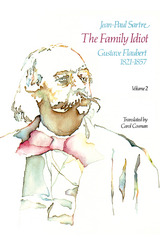
The Family Idiot
Gustave Flaubert, 1821-1857, Volume 2
Jean-Paul Sartre
University of Chicago Press, 1987
Seen by many as the culmination of Sartre's thought and project, and viewed by Sartre himself as an attempt to answer the question, "What, at this point in time, can we know about a man?" this monumental work continues to perplex its fascinated critics and admirers, who have argued about its precise nature. However, as reviews of the first volume in this translation agreed, whatever The Family Idiot may be called—"a dialectic" (Fredric Jameson, New York Times Book Review); "biography, philosophy, or politics? Surely . . . all of these together" (Renee Winegarten, Commentary); "a new form of fiction?" (Victor Brombert, Times Literary Supplement); or simply, "mad, of course" (Julian Barnes, London Review of Books)—its prominent place in intellectual history is indisputable.
Volume 2, consisting of the first book of part 2 of the original French work, takes the reader through Flaubert's adolescence well into his evolution as an artist. Sartre's approach to his complex subject, whether jaunty or ponderous, psychoanalytical or political, is captured in all of its rich variety of Carol Cosman's translation.
Volume 2, consisting of the first book of part 2 of the original French work, takes the reader through Flaubert's adolescence well into his evolution as an artist. Sartre's approach to his complex subject, whether jaunty or ponderous, psychoanalytical or political, is captured in all of its rich variety of Carol Cosman's translation.
[more]
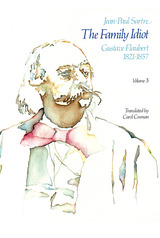
The Family Idiot
Gustave Flaubert, 1821-1857, Volume 3
Jean-Paul Sartre
University of Chicago Press, 1989
Seen by many as the culmination of Sartre's thought and project, and viewed by Sartre himself as an attempt to answer the question, "What, at this point in time, can we know about a man?" this monumental work continues to perplex its fascinated critics and admirers, who have argued about its precise nature. However, as reviews of the first volume in this translation agreed, whatever The Family Idiot may be called—"a dialectic" (Fredric Jameson, New York Times Book Review); "biography, philosophy, or politics? Surely . . . all of these together" (Renee Winegarten, Commentary); "a new form of fiction?" (Victor Brombert, Times Literary Supplement); or simply, "mad, of course" (Julian Barnes, London Review of Books)—its prominent place in intellectual history is indisputable.
Volume 3 consists of "School Years" and "Preneurosis," which are the second and third books of part 2 of the original French work. In vivid detail, Sartre renders Flaubert's secondary-school experiences and relationships: his part in a student rebellion against the faculty, his teenage infatuation with Romantic literature, his friendships and rivalries with his classmates, and the ironies inherent in the schoolboys' bourgeois existence. Sartre then discusses Flaubert's years at law school, where he studied at his father's insistence. This volume also contains Sartre's most sustained analysis of Madame Bovary. Sartre's approach to his complex subject, whether jaunty or judicious, psychoanalytical or political, is captured in all of its rich variety in Carol Cosman's translation.
Volume 3 consists of "School Years" and "Preneurosis," which are the second and third books of part 2 of the original French work. In vivid detail, Sartre renders Flaubert's secondary-school experiences and relationships: his part in a student rebellion against the faculty, his teenage infatuation with Romantic literature, his friendships and rivalries with his classmates, and the ironies inherent in the schoolboys' bourgeois existence. Sartre then discusses Flaubert's years at law school, where he studied at his father's insistence. This volume also contains Sartre's most sustained analysis of Madame Bovary. Sartre's approach to his complex subject, whether jaunty or judicious, psychoanalytical or political, is captured in all of its rich variety in Carol Cosman's translation.
[more]
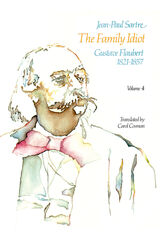
The Family Idiot
Gustave Flaubert, 1821-1857, Volume 4
Jean-Paul Sartre
University of Chicago Press, 1991
Seen by many as the culmination of Sartre's thought and project, and viewed by Sartre himself as an attempt to answer the question, "What, at this point in time, can we know about a man?" this monumental work continues to perplex its fascinated critics and admirers, who have argued about its precise nature. However, as reviews of the first volume in this translation agreed, whatever The Family Idiot may be called—"a dialectic" (Fredric Jameson, New York Times Book Review); "biography, philosophy, or politics? Surely . . . all of these together" (Renee Winegarten, Commentary); "a new form of fiction?" (Victor Brombert, Times Literary Supplement); or simply, "mad, of course" (Julian Barnes, London Review of Books)—its prominent place in intellectual history is indisputable.
Volume 4 consists of part three, books one and two, of the original French work. This volume, the fourth in a projected five-volume English-language edition, includes Sartre's discussion of the onset of Flaubert's illness, or neurosis, in 1844, and a significant reading of his L'Education sentimentale.
Sartre's approach to his complex subject, whether jaunty or judicious, psychoanalytic or political, is captured in all of its rich variety in Carol Cosman's translation.
Volume 4 consists of part three, books one and two, of the original French work. This volume, the fourth in a projected five-volume English-language edition, includes Sartre's discussion of the onset of Flaubert's illness, or neurosis, in 1844, and a significant reading of his L'Education sentimentale.
Sartre's approach to his complex subject, whether jaunty or judicious, psychoanalytic or political, is captured in all of its rich variety in Carol Cosman's translation.
[more]
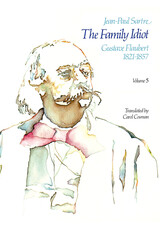
The Family Idiot
Gustave Flaubert, 1821-1857, Volume 5
Jean-Paul Sartre
University of Chicago Press, 1993
With this volume, the University of Chicago Press completes its translation of a work that is indispensable not only to serious readers of Flaubert but to anyone interested in the last major contribution by one of the twentieth century's greatest thinkers.
That Sartre's study of Flaubert, The Family Idiot, is a towering achievement in intellectual history has never been disputed. Yet critics have argued about the precise nature of this novel or biography or "criticism-fiction" which is the summation of Sartre's philosophical, social, and literary thought. In the preface, Sartre writes: "The Family Idiot is the sequel to Search for a Method. The subject: what, at this point in time, can we know about a man? It seemed to me that this question could only be answered by studying a specific case."
Sartre discusses Flaubert's personal development, his relationship to his family, his decision to become a writer, and the psychosomatic crisis or "conversion" from his father's domination to the freedom of his art. Sartre blends psychoanalysis with a sociological study of the ideology of the period, the crisis in literature, and Flaubert's influence on the future of literature.
While Sartre never wrote the final volume he envisioned for this vast project, the existing volumes constitute in themselves a unified work—one that John Sturrock, writing in the Observer, called "a shatteringly fertile, digressive and ruthless interpretation of these few cardinal years in Flaubert's life."
"A virtuoso perfomance. . . . For all that this book does to make one reconsider his life, The Family Idiot is less a case study of Flaubert than it is a final installment of Sartre's mythology. . . . The translator, Carol Cosman, has acquitted herself brilliantly."—Frederick Brown, New York Review of Books
"A splendid translation by Carol Cosman. . . . Sartre called The Family Idiot a 'true novel,' and it does tell a story and eventually reach a shattering climax. The work can be described most simply as a dialectic, which shifts between two seemingly alternative interpretations of Flaubert's destiny: a psychoanalytic one, centered on his family and on his childhood, and a Marxist one, whose guiding themes are the status of the artist in Flaubert's period and the historical and ideological contradictions faced by his social class, the bourgeoisie."—Fredric Jameson, New York Times Book Review
Jean-Paul Sartre (1906-1980) was offered, but declined, the Nobel Prize for literature in 1964. His many works of fiction, drama, and philosophy include the monumental study of Flaubert, The Family Idiot, and The Freud Scenario, both published in translation by the University of Chicago Press.
That Sartre's study of Flaubert, The Family Idiot, is a towering achievement in intellectual history has never been disputed. Yet critics have argued about the precise nature of this novel or biography or "criticism-fiction" which is the summation of Sartre's philosophical, social, and literary thought. In the preface, Sartre writes: "The Family Idiot is the sequel to Search for a Method. The subject: what, at this point in time, can we know about a man? It seemed to me that this question could only be answered by studying a specific case."
Sartre discusses Flaubert's personal development, his relationship to his family, his decision to become a writer, and the psychosomatic crisis or "conversion" from his father's domination to the freedom of his art. Sartre blends psychoanalysis with a sociological study of the ideology of the period, the crisis in literature, and Flaubert's influence on the future of literature.
While Sartre never wrote the final volume he envisioned for this vast project, the existing volumes constitute in themselves a unified work—one that John Sturrock, writing in the Observer, called "a shatteringly fertile, digressive and ruthless interpretation of these few cardinal years in Flaubert's life."
"A virtuoso perfomance. . . . For all that this book does to make one reconsider his life, The Family Idiot is less a case study of Flaubert than it is a final installment of Sartre's mythology. . . . The translator, Carol Cosman, has acquitted herself brilliantly."—Frederick Brown, New York Review of Books
"A splendid translation by Carol Cosman. . . . Sartre called The Family Idiot a 'true novel,' and it does tell a story and eventually reach a shattering climax. The work can be described most simply as a dialectic, which shifts between two seemingly alternative interpretations of Flaubert's destiny: a psychoanalytic one, centered on his family and on his childhood, and a Marxist one, whose guiding themes are the status of the artist in Flaubert's period and the historical and ideological contradictions faced by his social class, the bourgeoisie."—Fredric Jameson, New York Times Book Review
Jean-Paul Sartre (1906-1980) was offered, but declined, the Nobel Prize for literature in 1964. His many works of fiction, drama, and philosophy include the monumental study of Flaubert, The Family Idiot, and The Freud Scenario, both published in translation by the University of Chicago Press.
[more]

A Lion for Love
A Critical Biography of Stendhal
Robert Alter
Harvard University Press, 1986
READERS
Browse our collection.
PUBLISHERS
See BiblioVault's publisher services.
STUDENT SERVICES
Files for college accessibility offices.
UChicago Accessibility Resources
home | accessibility | search | about | contact us
BiblioVault ® 2001 - 2024
The University of Chicago Press









